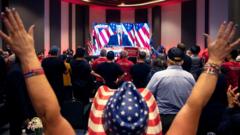As former president Donald Trump returns to the White House, his polarizing campaign reveals much about American voters' sentiments and stark divides.
**Trump's Remarkable Political Resurgence: A Second Chance**

**Trump's Remarkable Political Resurgence: A Second Chance**
Donald Trump defies the odds with dramatic election comeback after turbulent years.
In a stunning political turn, Donald Trump has effectively secured his return to the White House, marking perhaps the most dramatic comeback in modern U.S. history. Just four years after exiting the Oval Office, millions of Americans have cast their votes for him, eager to give him a second shot at leadership amidst a backdrop of economic and immigration concerns. Notably, his opponent, President Joe Biden, unexpectedly withdrew from the race close to Election Day, heightening the narrative of Trump's resurgence.
While ballots are still being tallied, early results show that a significant majority in critical swing states decided to back Trump, citing deep-seated worries over the economy and border security as primary motivators. Trump's victory is remarkable considering the many challenges he faced, including two assassination threats and ongoing scrutiny surrounding his controversial actions following his loss in the 2020 election.
Historically known for his incendiary style, Trump's campaign was characterized by a mix of contentious rhetoric and direct appeals to voters' personal economic experiences. Many constituents expressed frustration with the current administration's handling of financial issues, often recalling feelings of stability and growth during Trump's initial term in office. Despite acknowledging a wide array of factors contributing to current inflation, many voters attributed their struggles to Biden's policies.
Illegal immigration, reaching unprecedented numbers recently, played a significant role in bringing voters to Trump's side. While some might dismiss Trump’s views as overly harsh or extreme, many supporters merely echoed calls for tougher border controls. Trump's America First slogan resonated strongly across the political spectrum, with many voters questioning the prioritization of foreign aid to Ukraine over domestic needs.
The irony of a candidate, once perceived as a political outsider, now promising transformative change while holding office just four years prior isn't lost on observers. Unlike his previous ascension in 2016, Trump now encounters a political landscape shaped by personal and criminal controversies. His rhetoric remains heavily laden with attack and resistance towards critics, creating an increasingly polarized environment.
Notably, Trump's presidency and legal troubles loom large. He faces unresolved charges tied to the January 6 Capitol riot, and his past criminal accusations threaten to complicate his administration's future. However, a Supreme Court ruling might shield him from prosecution during his term, potentially allowing him to dismiss federal charges against himself.
Now crowned as the 45th President once more, the world watches how Trump's policies, including controversial tariffs and stances on global conflicts, take shape. As Americans brace for the implications of his second mandate, they are left to ponder whether they’ve truly elected a harbinger of change or a repeat of history.
While ballots are still being tallied, early results show that a significant majority in critical swing states decided to back Trump, citing deep-seated worries over the economy and border security as primary motivators. Trump's victory is remarkable considering the many challenges he faced, including two assassination threats and ongoing scrutiny surrounding his controversial actions following his loss in the 2020 election.
Historically known for his incendiary style, Trump's campaign was characterized by a mix of contentious rhetoric and direct appeals to voters' personal economic experiences. Many constituents expressed frustration with the current administration's handling of financial issues, often recalling feelings of stability and growth during Trump's initial term in office. Despite acknowledging a wide array of factors contributing to current inflation, many voters attributed their struggles to Biden's policies.
Illegal immigration, reaching unprecedented numbers recently, played a significant role in bringing voters to Trump's side. While some might dismiss Trump’s views as overly harsh or extreme, many supporters merely echoed calls for tougher border controls. Trump's America First slogan resonated strongly across the political spectrum, with many voters questioning the prioritization of foreign aid to Ukraine over domestic needs.
The irony of a candidate, once perceived as a political outsider, now promising transformative change while holding office just four years prior isn't lost on observers. Unlike his previous ascension in 2016, Trump now encounters a political landscape shaped by personal and criminal controversies. His rhetoric remains heavily laden with attack and resistance towards critics, creating an increasingly polarized environment.
Notably, Trump's presidency and legal troubles loom large. He faces unresolved charges tied to the January 6 Capitol riot, and his past criminal accusations threaten to complicate his administration's future. However, a Supreme Court ruling might shield him from prosecution during his term, potentially allowing him to dismiss federal charges against himself.
Now crowned as the 45th President once more, the world watches how Trump's policies, including controversial tariffs and stances on global conflicts, take shape. As Americans brace for the implications of his second mandate, they are left to ponder whether they’ve truly elected a harbinger of change or a repeat of history.




















